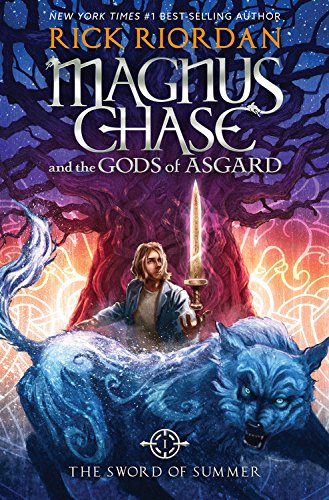All Nonfiction
- Bullying
- Books
- Academic
- Author Interviews
- Celebrity interviews
- College Articles
- College Essays
- Educator of the Year
- Heroes
- Interviews
- Memoir
- Personal Experience
- Sports
- Travel & Culture
All Opinions
- Bullying
- Current Events / Politics
- Discrimination
- Drugs / Alcohol / Smoking
- Entertainment / Celebrities
- Environment
- Love / Relationships
- Movies / Music / TV
- Pop Culture / Trends
- School / College
- Social Issues / Civics
- Spirituality / Religion
- Sports / Hobbies
All Hot Topics
- Bullying
- Community Service
- Environment
- Health
- Letters to the Editor
- Pride & Prejudice
- What Matters
- Back
Summer Guide
- Program Links
- Program Reviews
- Back
College Guide
- College Links
- College Reviews
- College Essays
- College Articles
- Back
Magnus Chase and the Gods of Asgard: The Sword of Summer by Rick Riordan
I'll admit I was a bit apprehensive. I am a fan of Rick Riordan's Greek-mythos-inspired novels (Percy Jackson and the Olympians and The Heroes of Olympus), but had yet to check out any of his other books. I feared disappointment, that Riordan simply wouldn't be able to recreate the magic. But, as far as The Sword of Summer, the first book in the Magnus Chase and the Gods of Asgard series is concerned, I am pleased to report that my fears were groundless.
Most books start out with the protagonist being faced with a conflict, a problem. Magnus Chase's problem is that he's dead.
Magnus is living on the streets, estranged from his family after the death of his mother. One morning he wakes to find that his uncle and his cousin (Annabeth Chase, a name immediately recognizable to Percy Jackson fans) are looking for him. Magnus's day goes downhill from there, culminating in him facing a fire jotun (if you don't know what that is, just imagine: Big. Scary. On fire.) armed only with a magic sword he doesn’t know how to use, and dying via a hunk of flaming asphalt to the gut. But instead of this being the end of his story, it's just the beginning. Magnus is rescued by a Valkyrie and taken to Valhalla, a spiffy hotel where the souls of those who died honorably train in preparation for Ragnarok (the Norse take on Doomsday).
Explaining much more would be both overwhelming and spoil the fun of reading it, but readers can expect Riordan's signature humorous, sometimes borderline sassy narration, a page-turning plot, and a cast of unconventional characters, from a dwarf who wants nothing more than to start his own fashion line, to Thor, the thunder god, whose hobbies include alternately smiting giants with his hammer and watching HD television on it. The Sword of Summer is an absolute treat, right down to the chapter titles. (Examples: "Phil the Potato Meets His Doom". "How to Kill Giants Politely". If you don't want to read this book just because of the chapter titles, then I don‘t know what to tell you.)
Whether you've devoured Rick Riordan's earlier books, or you're a new arrival to his world of gods and monsters, give The Sword Summer a try. I'll bet that, like me, you'll reach page 491 already wanting the sequel.
Similar Articles
JOIN THE DISCUSSION
This article has 0 comments.


8/10